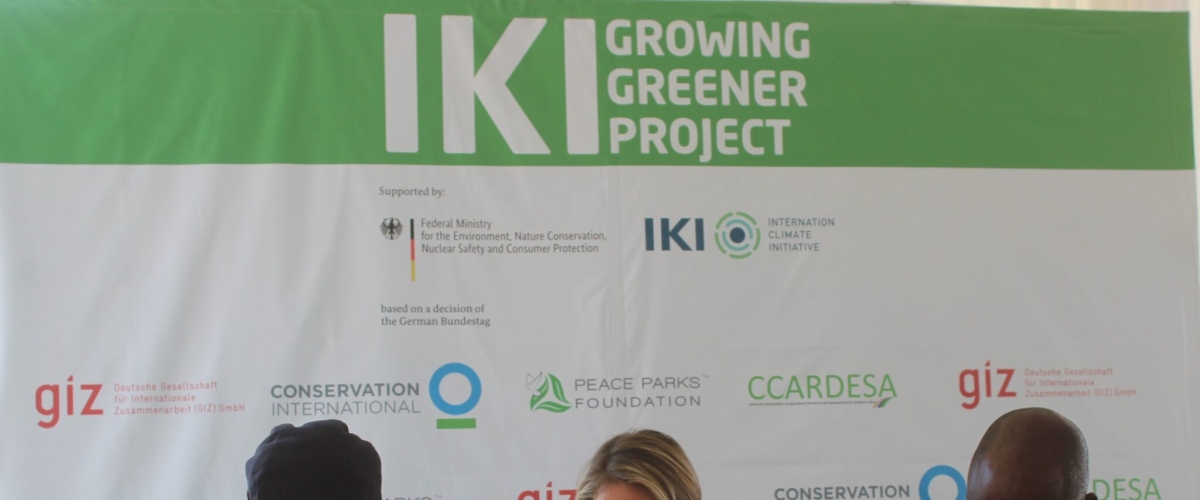
By Mabvuto Banda
Over 75 percent of Southern Africa is covered by semi-arid and arid ecosystems, and more than 70 percent of the population relies on agriculture. With rich biodiversity and valuable ecosystem services, about 25 percent of productive land is threatened by soil degradation and desertification due, in large part, to unsustainable land-use practices. This has major implications for biodiversity and human-wildlife conflict, putting agro-pastoral livelihoods at risk.
Grazing lands, covering about 45 percent of the region’s total land, are diminishing due to land pressures resulting from inequitable land ownership and limited use of technologies suitable for intensive production. As a result, over 45 million people in 10 countries in the Southern African Development Country (SADC) are facing acute food insecurity, coupled with climate change, which has also exacerbated the situation.
On this premise, the German Federal Ministry for the Environment, Nature Conservation, Nuclear Safety and Consumer Protection (BMUV), through GIZ with its consortium partners Peace Parks Foundation (PPF) and the Centre for Coordination of Agricultural Research and Development (CCARDESA), has launched the International Climate Initiative (IKI). This project will be implemented in the Mwandi District of Western Province at Simalaha Community Conservancy (SCC), Botswana, Madagascar, and South Africa.
Speaking during the launch, GIZ Water and Energy Cluster Coordinator Anke Peine-Ellis said the project aims to combat desertification, enhance biomass and biodiversity, increase soil carbon, and build resilience to climate change. She added that improved livestock health and productivity will enable female and male agro-pastoralists to increase their earnings from animal products, making them more resilient to climate shocks.
“The project is aimed at working with agro-pastoralists to adopt innovative land-use practices and nature-based solutions, developing soil and landscape restoration economies through public and private investments, market access, ecosystem valuation, and green Small, Medium and Micro Enterprises (SMME) support,” said Ms Ellis. She further hinted that the project will strengthen an enabling policy framework for sustainable land use and enhance the capacity to scale up sustainable management practices across Southern Africa.
Peace Parks Foundation (PPF) Regional Director, Professor Andrew Nambota, said the project would also promote Herding for Health (H4H), a community-driven livestock and rangeland management approach. Professor Nambota stated that the H4H approach will lead to controlled rotational herding, which will ensure improved livestock, land productivity, and less degradation through the implementation of community-governance structures in Simalaha Community Conservation (SCC). “The community will decide how best to enable collective action, with support from the Project Team. It is foreseen that agro-pastoralists engaged in the project will benefit in several ways, resulting in increased incomes and building resilience to climate change and other environmental risks,” he said.
Meanwhile, the Director of the Ministry of Fisheries and Livestock responsible for the Livestock Department, Mwambila Kabemba, who graced the event, said the project will benefit more than 860 households, 1,836 heads of cattle with improved grazing and water points as well as over 30, 000 hectares will be enhanced to better grazing land. Mr Kabemba added that the Growing Greener Project aligns perfectly with the national goals of fostering sustainable development. The project is fascinating because it embodies a holistic approach to addressing the challenges faced by farmers and communities living in and around protected areas. “By integrating sustainable production and consumption practices, we are not only aiming to improve agricultural productivity but also to ensure that our natural resources are managed wisely and preserved for future generations and also create a balance between human needs and the health of our ecosystems,” he added.
Mr Kabemba stated that the project will focus on capacity building of communities, especially women and youth, to engage in sustainable enterprises that contribute to their economic empowerment by fostering innovation and supporting local initiatives, which will create a ripple effect that enhances food security and promotes economic resilience. “With the collaboration and involvement of various stakeholders, this project can create a sustainable future that honors our commitment to environmental management and the well-being of our people but also sets a benchmark for future projects in sustainable conservation development and environmental conservation,” Mr. Kabemba said. He thanked GIZ, CCARDESA, Peace Parks Foundation, and Conservation International for their tireless efforts in making the kickoff event and the project possible.
Speaking on behalf of the beneficiaries, Barotse Loyal Establishment—BRE Induna LIMBA thanked the project's sponsors and reaffirmed its traditional commitment to its fruition. The 4.5 Million Euro Project will run from October 2023 to September 2029 and is expected to contribute to the creation of Green jobs and improved household income through enhanced herd management and access to markets in the district. -NAIS
The author is a reporter at National Agriculture Information Services(NAIS)





